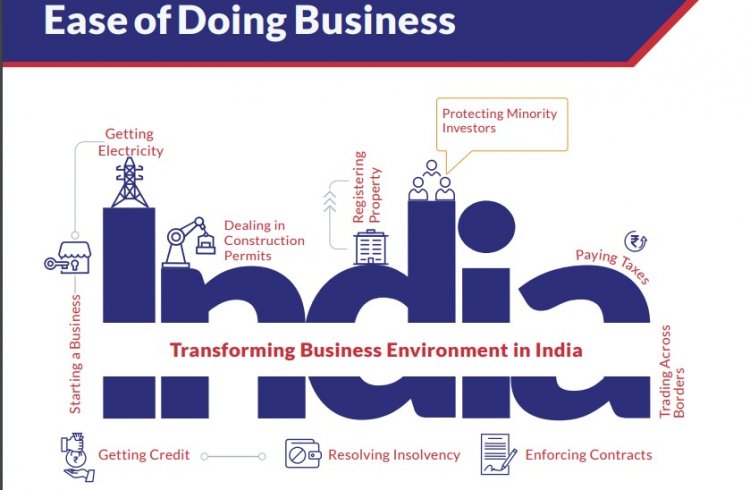Business Environment in India: Increasing the Ease of Doing Business
There was once a period when the question "Why India?" was posed due to the preexisting conditions. Now that the effects of the changes have been examined, some are asking, "Why not India?"

A decade ago, India as a top business travel destination was unthinkable.
Any person who is interested in conducting business in India must be prepared to wade through a sea of complicated and laborious procedures. The dismal image that foreign investors had of India as a location for doing business was reflected in the poor Foreign Direct Investment numbers.
There were a multitude of issues plaguing India. The investor had to deal with a multitude of different agencies in order to get clearances and had to go through a lot of trouble to get licences and approvals granted. In order to get a case resolved in India, one must be willing to suffer through the excruciatingly long waiting periods, and even winding down business operations can be a difficult challenge. There was an all-time low in the level of confidence that the international community had in India. Along with its confusing systems and regulations, India has the dubious distinction of being known as the bureaucratic capital of the world, which does not inspire confidence among investors.
The Doing Business Report is an annual assessment that the World Bank performs on 190 economies to rank them on how easy it is to do business in a country based on 10 criteria that span the entire business lifecycle. This report is published by the World Bank (DBR). The investment climate in India was reflected in the Doing Business Report of 2014 (DBR 2015) published by the World Bank. According to this report, India ranked a dismal 142nd out of 190 economies.
In the year 2014, with the steadfast direction provided by the HonorableThis procedure was subjected to a comprehensive transformation as a result of the inventive response of the government, Prime Minister Shri Narendra Modi. This marked the beginning of the journey of government process reengineering, which brought together numerous ministries and departments of the Centre and State to work toward the common goal of making India the most preferred business destination in the world.
The Department for the Promotion of Industry and Internal Trade (DPIIT), which serves as the institutional backbone of the Ease of Doing Business programme, was given the responsibility of carrying out this challenging assignment.
DPIIT played the role of a fulcrum and was responsible for implementing a unified strategy by dismantling the silos and collaborating in networks with all of the government agencies. Key reformative steps that were taken included conducting a detailed gap assessment of the business ecosystem, conducting a spring cleaning of regulations, making concerted efforts to bridge the digital divide, and soliciting regular feedback from stakeholders in order to actively gauge reform implementation at the ground level.
It paid off, as India is now ranked 63 in the Doing Business Report 2020 published by the World Bank, a meteoric rise of 79 ranks from its previous ranking of 142 in 2014. The increased ease of conducting business in India now provides a business environment that is conducive to business, and DPIIT is committed to charting the path of furthering this initiative; to translate it into ease of living for its citizens. This environment is conducive to business.
Soon after Prime Minister Shri Narendra Modi, as part of the "Make in India" initiative made a special mention about the need to improve India's ranking in the World Bank's Doing Business Report, there was a paradigm shift in the approach and strategy of India. This occurred shortly after the "Make in India" initiative was launched. Alongside various other programmes, the EoDB took centre stage as one of the most important pillars in the effort to develop India as a preferred investment destination.
Simplifying the Complexity of India's Current Business Ecosystem
The Ease of Doing Business Project, which is run by the World Bank, is the primary impetus behind regulatory changes. It ranks 190 economies based on ten parameters that span the entire business cycle, from the cradle to the grave, and uses a predetermined methodology to determine how easy it is to conduct business in each nation.
Starting a business, registering property, dealing with construction permits, obtaining electricity, obtaining credit, paying taxes, trading across borders, protecting minority investors, enforcing contracts, and resolving insolvency are the parameters that are included here.
RESOLVING INSOLVENCY
When it came to resolving insolvency issues, the Insolvency and Bankruptcy Code of India (IBC), which was introduced in 2016, was a major changer. The purpose of the Code is to ensure that the value of assets is maximised by favouring reorganisation of the Corporate Debtor over its liquidation as the primary resolution option. The fact that the creditor, rather than the debtor, is in command of the proceedings has contributed to the Code's success. The fact that the recovery rate has increased to 71% is proof that it was successful. The Code has been changed to include a pre-packaged insolvency resolution process, also known as PPIRP, for micro, small, and medium-sized enterprise corporate debtors (CD). By combining the expediency, speed, cost-effectiveness, and flexibility of workouts outside the courts with the binding effect and structure of formal insolvency proceedings, the goal of this is to cause a minimal amount of disruption to the business activities of MSME debtors in order to preserve jobs. This is accomplished by combining the two sets of qualities. The insolvency law in India is constantly being updated, and what was previously a drawn-out and agonising procedure for closing a business is now a process that is both quicker and more effective.
TRADING ACROSS INDIAN BORDERS
The electronic sealing of containers, the upgrading of port infrastructure, and the allowance of electronic submission of supporting documents with digital signatures have all contributed to a significant reduction in the amount of time and expense required for exporting and importing. It has been determined that Phase I of the Fourth Container Terminal at the Jawaharlal Nehru Port Trust is now active, and it is anticipated that Phase II would be completely operational by the years 2022 and 2023.
WORKING TOWARDS A COOPERATIVE FEDERALISM BY ENGAGING THE STATES AND UTs
The World Bank's Doing Business Report provides an analysis of the business climate in both Delhi and Mumbai. In 2014, the Business Reform Action Plan (BRAP) was initiated in order to model the changes that were carried out on a national scale in India. This endeavour is being led by DPIIT, and its purpose is to encourage competitive federalism by providing an incentive for states and UTs to create the business environment that is the most favourable. India is one of the few countries that has a sub-national ranking exercise, and under BRAP, all states and UTs are ranked on the basis of the reforms that they have undertaken based on designated factors. India is one of the few countries that has a sub-national ranking exercise.
It is a transformative programme that is presently in its fifth edition and will cover 301 sub-reform points spread over 15 reform sectors in its 2020 edition. The Department of Public Information and Internet Technology (DPIIT) has created a specialised online portal that can be accessed at www.eodb.dipp.gov.in and is intended for use by the States and UTs in order for them to submit evidences of the implementation of these reform points and user data in order to receive feedback on reforms. This is the first platform of its kind, and it enables users to share knowledge about regulatory compliance requirements and rankings for all of the country's states and territories. The evaluation of reform implementation in accordance with the Business Reform Action Plan 2020 is entirely dependent on input from end users, in accordance with the best global practises.
In order to guide and assist states and territories through the process of reform implementation, several capacity building programmes are being carried out. The best practises developed by states are also disseminated to the other states and territories in an effort to encourage similar transformations and versions throughout the many reform sub-areas.
The Ease of Doing Business and the Ease of Living will be the primary focuses of the reforms that are being implemented as part of the BRAP 2022 initiative, which is now being rolled out.
Ease of Doing Business Way Forward
The rankings of the "Ease of Doing Business" are a yardstick that measures the improvement in the area of government reforms, and they are an essential component of the AtmaNirbhar Bharat Abhiyaan. The government of India is committed to creating a business environment that is welcoming of both domestic and international investments and provides robust support for both types of investments.
In order to make this vision a reality, the next phase of reforms will concentrate on lessening the burden of compliance that will be placed on firms and individuals.
As a result of shifting demographics and advances in technology, a significant number of compliance standards have become obsolete and superfluous. Along these lines, the DPIIT is currently coordinating a time-bound methodical exercise that will be carried out throughout all of the Ministries and States. This effort is geared toward the simplification and rationalisation of compliance requirements, the decriminalisation of minor civil offences, and the elimination of laws that serve no purpose. An enjoyable interaction between citizens and the government is something that the government is working hard to achieve.
Since 2014, DPIIT has been an agent of change, working to improve the business ecosystem by collaborating with a wide variety of ministries, states, sectors, and industry associations on the implementation of reforms in accordance with the Ease of Doing Business Project and the Business Reform Action Plan. The guiding principle of the Honorable Prime Minister, which is "Minimum Government, Maximum Governance," is largely responsible for securing India's position in the global community as a leading location for commercial activity.
Because of his unwavering faith in "Governance" rather than "Government," the Honorable Prime Minister has been able to realise his enormous goal of accomplishing the inconceivable. This was made possible by his unwavering belief. Results have been achieved as a direct consequence of the unwavering dedication of the Indian government to driving change at all levels, from the highest to the lowest. Despite this, there is still a significant amount of room for improvement. Together with the political and administrative will, as well as an effort to move closer to international best practises, the Government of India is committed to translating the Ease of Doing Business into an Ease of Living for every citizen of this country. This commitment includes an endeavour to move closer to international best practises.
What's Your Reaction?




















